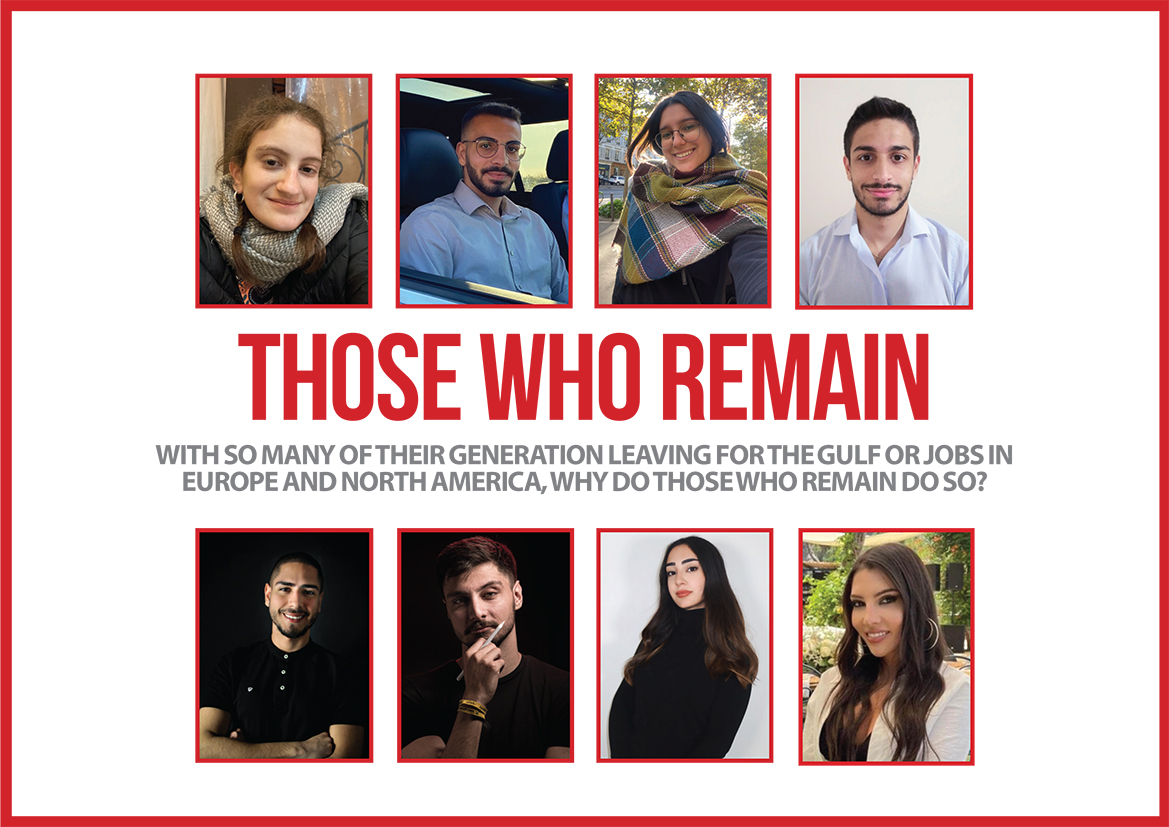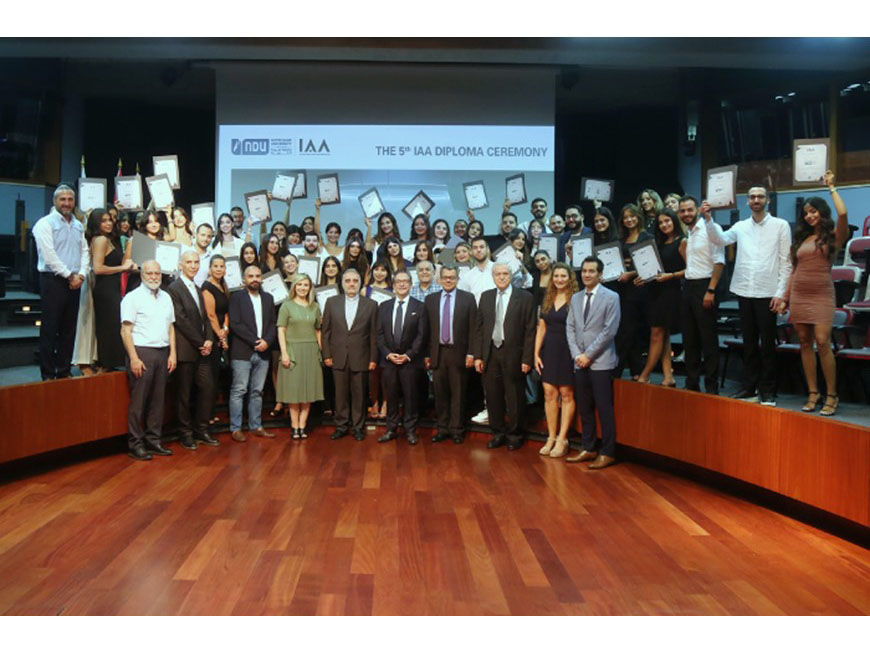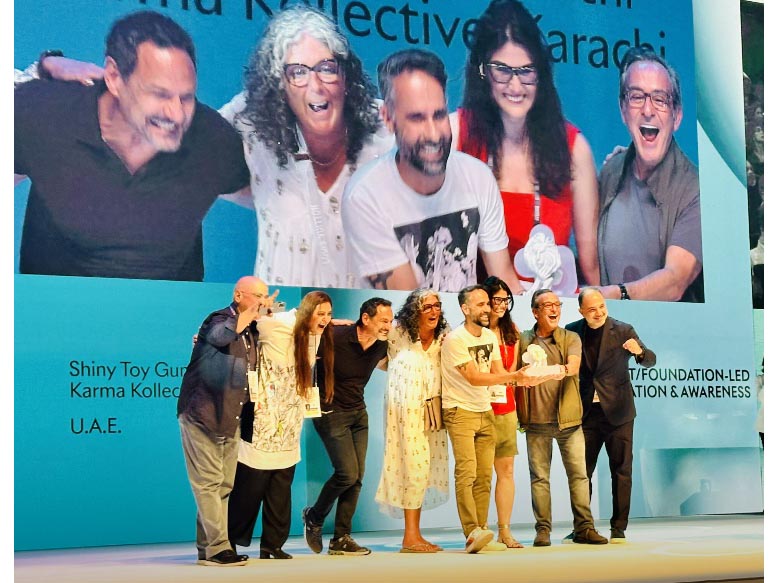News - Advertising
Lebanon advertising community: Those who remain
by Iain Akerman
May 1, 2023

With so many of their generation leaving for the Gulf or jobs in Europe and North America, why do those who remain do so?
“Staying in Lebanon has not been an easy choice, and I would be lying if I said I never considered leaving,” says Michel Bassil, a content executive at Leo Burnett. “At the end of the day, my decision was based on weighing the pros and cons of staying, and realising that the pros outweigh the cons.”
Why do young Lebanese choose to remain in their homeland when so many of their generation opt for an easier and more lucrative life abroad? What keeps them in a country that has alarming levels of poverty and food insecurity, according to Human Rights Watch, and whose citizens have been reduced to holding up banks in a desperate attempt to access their own money? It’s a perfectly natural question, given the circumstances.
If nothing else, their answers provide valuable insights into the mindset of a generation that has had to endure financial collapse, a global pandemic, one of the biggest non-nuclear explosions in history, and an incessant and destabilising political crisis.
“I still choose to call Lebanon ‘home’, despite the ongoing political and economic struggles, because I am bound by a deep emotional attachment to my homeland and cultural heritage,” explains Nadine Chmayssani, a senior copywriter at Wunderman Thompson. “For some, family and job responsibilities keep them rooted in the country, but for most of us, the decision to stay or leave is not an easy one. It is shaped by a plethora of factors and personal circumstances. But one thing is for sure, the strength and determination we have as Lebanese people will never falter. So, I choose to stand by my people as we navigate through these tumultuous times, because I strongly believe that, together, we will rise above the challenges and emerge stronger than ever before.”
Agencies, of course, are happy to encourage this emotional attachment. International networks have increasingly concentrated their creative and digital teams in Lebanon, refocussing on Beirut and reducing reliance on Dubai. Why?
Cost is one reason. Compared with cities across the Gulf, Beirut is cheaper, not only in terms of salaries, but in terms of overall operational expense. A fact that has only been accentuated by the country’s economic crisis.
The quality of students is another factor. It’s almost a cliche now, but the country’s trilingual graduates form a national reservoir of talent that agencies are keen to tap into. “Our Beirut office has always played a creative excellence hub for our group,” says Dani Richa, chairman and chief executive for BBDO Middle East, Africa and Pakistan. “In the last couple of years, more focus was put on regional clients. With that in mind we grew and strengthened the team to cater for our growth and diversification regionally.”
“Moving abroad is “something everyone should experience for their own growth.”--Lea Daher
But there’s also an emotional element at play. There has been a conscious decision to capitalise on local talent, but also to support Lebanon in a time of need. TBWA\Raad has been growing its Lebanon office for the past couple of years, hiring a pool of talent to cater to other markets and to work on regional projects. It has done so not purely for practical reasons, but for patriotic ones, too. Those reasons include helping the country to sustain itself, supporting talent that wishes to remain, and attempting to ensure that Lebanon retains its position as a regional creative hub.
“I turned an offer abroad as I believe I wouldn’t have had “the same chance to learn and grow like I do at my current job.”--Joe Nawfal
“After the economic crisis, Lebanon became mostly a hub for regional clients, which gave young creatives unprecedented exposure to regional work and the chance to diversify and inflate their portfolios,” says Jad Chidiac, a senior art director at TBWA\Raad. “Big agencies are still offering good compensation packages that ensure a fair quality of life relative to the current situation, and most talent has already left the country so it’s not a highly competitive job market. This created an environment where junior/mid-level people in advertising have no reason to leave their families and loved ones and work abroad.”
This is good for those who wish to remain in Lebanon, but a combination of high demand and the exodus of talent has made recruitment a major challenge, especially for independent agencies. Smaller companies that struggle to match the compensation packages offered by the big networks are at a noticeable disadvantage. So much so that some declined to contribute to this article for fear of their employees being poached.
“Unless it is absolutely necessary for me to leave, I’ll be sticking around in Lebanon for the foreseeable future.”--Michel Bassil
“Good talent either fled or is tied with larger networks,” says Moe Minkara, the founder and creative director at Mink. “What is more difficult lately is also talent retention. Because today it is much easier for a network agency to fish good talent from independents. Sometimes it is just impossible to compete financially. I had no choice but to match salaries of networks where possible and to create a culture and vibe that’s worth more than money.” According to Minkara, salaries are approaching the 80 to 90 per cent mark compared with pre-2019 levels. This is challenging for smaller agencies, but hugely beneficial for the talent that remains.
“One of the reasons why I’m still working in the country is because of the safety I feel at the agency in Beirut,” says Joe Ohanessian, a senior executive at Starcom. “We went through a pandemic, an explosion and multiple challenges. However, the only thing that has remained stable is the safety net of working at Publicis, which has facilitated a smooth transition financially, professionally and personally. It makes me feel like I belong to a big family with who you shared hardship and content, creating eventually a sense of belongingness. Similarly, I remain in Lebanon for my actual family, who I wouldn’t leave just because things got tough, while I know that my presence is required to support them the way they [supported me when I was] growing up.”
“If my career requires leaving Lebanon, I would do it, but only if the opportunity is right.”--Leah Faddoul
Family is an important factor for all of those who choose to stay in Lebanon. As Ohanessian says, his decision to remain is both an emotional and a practical one. A safe and stable work environment, sure, but an attachment to family and friends and a lifestyle that “would be hard to recreate abroad” are arguably more important factors.
“I feel like I have a better chance of succeeding abroad in what I plan to achieve in my career.”--Aya Boukhouloud
“To be honest, family holds a significant place in my life,” admits Chmayssani. “It is a fundamental aspect that shapes my decisions and defines who I am. So, when I consider the reasons behind my decision to stay, despite the ongoing trials and difficulties, family is at the forefront. In fact, the energy this place radiates, as well as the emotional bond I share with my loved ones, is a driving force that keeps me rooted in this country. And while this decision may come at a cost, I am willing to make that sacrifice with a sense of purpose and happiness. It is this deep emotional connection and the value I place on family that ultimately guides my choices and keeps me in Lebanon.”
Bassil agrees. “When we think about the most important things in life, it has to come down to family and friends,” he says. “Obviously, staying close to the ones you love isn’t easy with all of the economic hardships that we see around us on a daily basis, and I don’t blame people for leaving. It’s not easy to be in a place where most people are suffering economically and psychologically, which is why I don’t really watch the news and try to distance myself from what is going on. Nonetheless, I consider myself one of the few who are fortunate enough to stay here with the ones I love, while also having hopes and ambitions of a successful career at the company I work for, Leo Burnett.”
“Big agencies are still offering good compensation packages that ensure a fair quality of life.”--Jad Chidiac
All of those featured have been offered positions abroad at some stage or another. Chidiac had several opportunities to leave but turned them down for practical reasons. Chmayssani, too, could’ve left but stayed because of her deep emotional connection to the culture of her homeland. “While such opportunities may have presented themselves, they did not align with my personal priorities and values,” she says. “And so, I believe that my decision to stay, despite the ongoing challenges, is the right one for me, for the time being.” However, she does not rule out working abroad in the future. “We all know the future is unpredictable, and I am open to exploring opportunities that align with my personal and professional growth,” she says. “Although the love I have for my country will always be a significant factor in any decision I make regarding my future.”
Of the four employees ArabAd spoke to at Hopscotch, all have been offered opportunities to leave the country. Lea Daher, an account executive, was given the chance immediately after graduating, but wanted to gain experience in Beirut first. However, she believes that moving abroad is “something everyone should experience for their own growth”. Joe Nawfal, a community manager, says his connection to Lebanon is an emotional one and turned down an opportunity to more than double his salary abroad. Why? Because he wouldn’t have had “the same chance to learn and grow like I do at my current job”.
“Even though I did have opportunities to leave, it always felt that it was the wrong offer at the wrong time,” adds Ohanessian. “I’m a true believer that everything happens for a reason. So for now, Beirut is where I’m comfortable, where I’m happy or trying my best to be. But never say never, we are all volatile beings and once I visualise a convenient aperture to move, then I would explore going after what would make me a better version of what I am.”
“The decision to stay or leave is not an easy one. It is shaped by a plethora of factors and personal circumstances.”--Nadine Chmayssani
Leah Faddoul, an English copywriter at TBWA\Raad, believes that “working outside your comfort zone is eventually essential to develop as a creative in the industry”. As such, even though Lebanon “remains a little gem that I cherish and love with all my heart”, she cannot turn a blind eye to practicalities. “If my career requires this shift [leaving Lebanon], I would do it, but only if the opportunity is right.”
Aya Boukhdoud, a university student and communications coordinator at Hopscotch, is more direct: “I feel like I have a better chance of succeeding abroad in what I plan to achieve in my career,” she says. “I wish to experience a new way of life. I unfortunately don’t see that happening for me in Lebanon.”
Where does this leave Lebanon? In potentially good hands if those who wish to remain continue to do so. Chidiac, for one, hopes that Lebanon reclaims its title as “the centre of regional creative flair”, while Faddoul believes those working in the advertising industry can in fact help Lebanon. “As long as there are problems, there must be solutions,” she says. “Unlike other occupations and industries, people in advertising have a superpower, which is the ability to play a part in coming up with creative solutions that brands can adopt and that would benefit our country.”
“Unless it is absolutely necessary for me to leave, I’ll be sticking around in Lebanon for the foreseeable future,” says Bassil, who recently moved from Bikfaya to Beirut to avoid commuting for two hours every day. “I’ve been lucky enough to travel around on educational scholarships, and I can confirm that the clichéd saying you see on people’s doormats is true – there’s no place like home.”
“Beirut is where I’m comfortable, where I’m happy or trying my best to be.”--Joe Ohanessian
The move to Beirut has also made Bassil feel like “one of those guys who moved from their little town in the US and got a job on Wall Street, except the food in Beirut is better. People in Beirut, just like most Lebanese people, are very warm and welcoming. So, if you’d ask me what the best thing about living and working in Beirut is, I’d tell you it’s being greeted with a smile, anywhere you go, whoever you meet… and obviously the food.”
As is to be expected for a generation that has experienced so much trauma, all hope for a brighter future, particularly Chmayssani. “My hope for the immediate future is for the country to overcome its current challenges and for its people to prosper,” she says. “I hope for stability in the political and economic spheres and for a resolution to the ongoing crisis, as I believe that the resilience and determination of the Lebanese people can bring about positive change that will hopefully lead to a return to a sense of ‘normalcy’ for all citizens. I genuinely hope for a more inclusive and equitable society that values diversity and promotes social justice. Above all, I hope for a future where the Lebanese people can live in peace and security, free from fear and uncertainty… because we deserve it all.”













